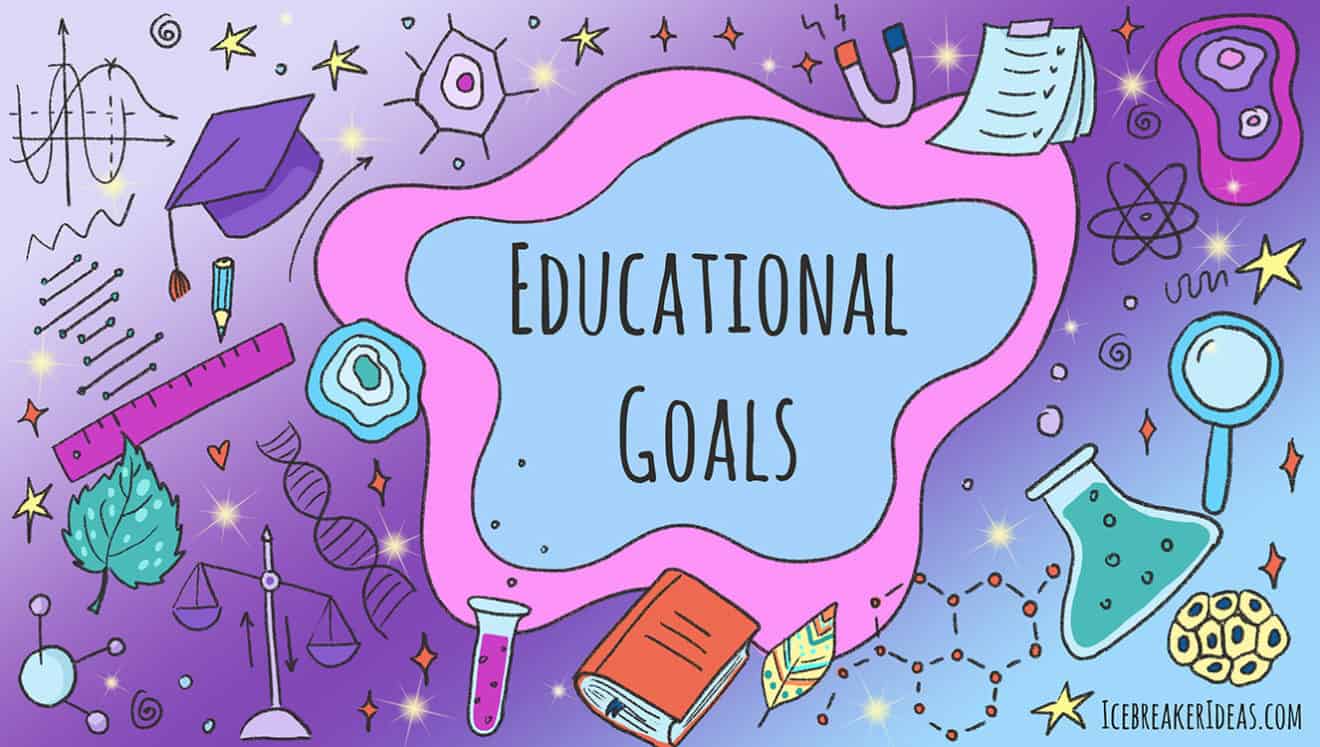The purpose of education should be to help a student reach their potential. To make sure this occurs, it is important to set educational goals. Whether you are a teacher or a student, defining what must be learned and how to accomplish the goals sets a foundation for effective learning. In this article, we will begin by defining what are educational goals. Next, we will provide some specific examples of educational goals. Next, we will list some broad educational goals which apply to every area of study. Finally, we will list some educational goals for students.
Table of Contents
What Are Educational Goals?
Educational goals are statements describing skills, attributes, and competences students should have while pursuing a program or course of study. Educational goals state what the teacher or student wishes to achieve. Areas of attitude, skills, and knowledge may be stated individually or combined when forming educational goals. The following list provides an overview of some universally accepted goals for education:
- Master Basic Skills
Overall, this goal involves the basic mastery of math and language arts skills. Additionally, the learner needs to know whatever basic skills are applicable to their specific area of specialized learning. - Define Areas of Interest and Talent
Although the primary role of educational goals is to increase knowledge, it is important to define the learner’s interest and passions. Having the ability to support oneself is important, but true satisfaction comes from working in an area one enjoys. Additionally, one needs interest and pursuits outside of one’s field of employment to truly feel fulfilled. - Become a Critical Thinker
One of the purposes of education is to develop the ability to think critically about circumstances one encounters. It is important to be able to analyze information to find the validity of what is being learned. Critical thinking also allows one to strategize and trouble shoot, a skill useful in so many areas of one’s life. - Develop A Moral Framework
It is important to learn to interact appropriately with others and have a religious or cultural reason for one’s behavior. Doing so provides a basis for how we ought to act. One needs to have the ability to distinguish right from wrong when making decisions. Part of setting one’s educational goals involves developing a moral framework. - Become a Good Citizen
The student should know how the country in which they live is governed. Additionally, they should know about taxation, how leaders are chosen, and become active participants in their communities. - Find Satisfaction
An important, but often ignored, goal is to find satisfaction in life. The ability to enjoy accomplishments, engage others in meaningful relationships, and have both physical and emotional health benefits the learner in all areas of their life.
Educational Goals Examples
Your educational goals will be an individualistic as you are. However, the following list of examples will help you get started making your own. It is fine to list goals for things you already do. For example, if you keep a detailed schedule, you might wish to set a goal of adhering to your schedule even when it becomes difficult to do so. Remember that your personal educational aspirations will becoming a reality much faster and easier when stated as an educational goal.
- Create Attainable Goals
Goals must clearly define exactly what you wish to accomplish, taking into consideration the direction in which you are heading. You must also consider what talents and abilities will help you attain your goals. Unrealistically setting goals not relevant to your end desires will only lead to frustration. - Make a Realistic Schedule and Create a Timetable
Setting times for completion of each educational goal will keep you focused. Make a yearly plan, and a semester, quarterly, or monthly schedule. Then plan for each upcoming week. Your weekly schedule should remain nearly identical unless something, such as the start of new classes, interferes. Include class and study time, regular meal and sleep hours, and time for relaxation. Tweak your schedule as needed, but make sure you do not avoid tasks you find unenjoyable. - Be Positive and Confident
Once you have set achievable and realistic goals, approach them positively, and it will be much easier to meet success. Look at each goal as a challenge and avoid worrying about the tasks you must do to reach it. Doing so reduces stress and helps avoid discouragement. - Explore New Activities
When you set your goals, be sure to include time to try something new. Learn a sport, take up a new form of exercise, or explore an area of interest you have always been curious about. Doing so keeps the mind and body fresh and creates a sense of adventure. - Reach Out to Others
We do not live in isolation. Reach out to fellow classmates, perhaps forming a study group. Get to know your roommate, if you have one. Remember that your family can be a support network as well; stay in touch with them and even include family time on your written schedule. - Remain Determined
Not everyone and everything will support the educational goals you have set for yourself. Ignore negative comments, remembering you know what your goal is and have set a realistic path for achievement. If necessary, stay away from those who are not supportive of your efforts. - Accept Failure and Move On
Very successful people will tell you that they have failed, often many times. We learn from our mistakes and failures. Look at any setback as an opportunity for reevaluation. Sometimes we must adjust areas of our goals, schedules, and plans to achieve success. - Learn Patience
Anything worth accomplishing may take some time. That is why your schedules include one for a longer period, one for a shorter time, and a weekly schedule. Concentrate on the task you must accomplish next and avoid looking too closely as how much must be done for each goal. Using a checklist for projects and tasks can help your concentration on the next thing to do. - Avoid Overworking
There is such a thing as working too much. Avoid mental and physical exhaustion by scheduling breaks for yourself. You may find a short afternoon nap refreshes you and allows you to stay up later at night. Just remember to make healthy choices for your relaxation time, avoiding alcohol and any other artificial stimulants or relaxers. - Avoid Bad Habits
A habit is very hard to break, usually doing so takes about three weeks. It is even harder to form a new good habit, taking two months or more. This is another reason for establishing your educational goals, as you will learn how to adhere to positive habits and tasks to achieve them. One of the worst bad habits students often possess is procrastination – putting off doing what must be done. Again, your schedule can help as you will have a place to list when assignments are due and the steps you must take to get them done on time.
List of Educational Goals
Now that we have defined broad educational goals, let’s look at some more specific goals for educational success. The benefits one obtains from setting educational goals are not merely good grades and a diploma, but patterns of behavior to last your entire life. Remember that in the future you will set professional goals and life goals – the things you wish to achieve in every area of your life. The first goals one usually sets are educational goals, so taking the time to make them realistic and achievable serves one well in the future. The goals we have listed are intentionally broad and will apply to any level of education.
- Excel in Your Classes
The primary educational goals will be met easier if you do well in all your classes. Pay attention in class, read your textbook, and take notes. Each evening set aside time to review your notes and prepare for the next day’s classes. Communicate with each instructor, as your expressed interest in their class can often lead to better learning and maybe even a better grade. - Take an Elective Course You Enjoy
Make time in your academic schedule for a class in some area you wish to explore or that you already enjoy. A class in art, music, or maybe the history of cinema can break up your academic day and provide a refreshing experience. - Live Comfortably
Have a place to call your own, whether it is in your parent’s home, a dorm room at the local college, or an apartment with friends. Make sure it has good lighting, a comfortable bed, and a designated place for studying. You will reach your goals easier if you have a physically and emotionally pleasing environment. - Take Care of Yourself
Eat right and get plenty of rest. College students frequently gain weight if they are not careful, because they are tempted to eat high carb foods. Sometimes students get too busy studying and do not get enough exercise. Make sure your schedule indicates meal and snack time, as well as when to go to bed and when to rise each day. - Make New Friends
Reach out to others and form friendships. You will need the support from others as you work to reach your goals. Your friends can help you find sources of relaxation when you feel stressed. Good friends can also serve as a sounding board for discussion of your goals and help keep you on track for success. - Join A Group
Play in the band, join a social or political club, or find a team that participates in a sport you enjoy. Group participation brings out your creativity and talent and develops social skills. Additionally, they are good for your emotional health as they are fun. - Explore
Learn new things and have new experiences by exploring the area in which you live. Taking a walk around your school campus or neighborhood provides exercise. Explore a local museum, art gallery, or zoo. Visit nearby historic sites. For additional fun, take some of your new friends with you. - Learn to Be Happy
Happiness is a choice and you need to start each day with a positive attitude. Should you find you are unable to focus on class work, assignments, or that small daily problems seem to overwhelm you, you might suffer from depression. Talk to your doctor about changes in your diet and physical activity. They might recommend medication if your problem is severe.
Educational Goals for Students
Set your school goals before each school year begins. Make a commitment to put in the time and effort for success. Recognize that an education is a privilege and if you approach each year with a positive attitude and realistic goals, you will find learning can be fun. Read through the following before listing your own educational goals:
- Attend All Classes
Commit yourself to be present and on time to every class. Failure to attend class causes one to get behind and almost guarantees a lower grade. If you must miss class, ask the instructor what you missed and let them know your absence was unavoidable. - Remain Engaged During Class
Take class seriously and remain focused. It will help you pay attention to take notes during class, even if note taking is not required. You can also follow along in your textbook and highlight points covered in class. It is a proven fact that note taking increases concentration and greatly improves the amount of information retained. - Ask Questions
While you are taking notes, jot down questions you have. Wait to ask them till the end of class, as the instructor might answer your questions later in the lecture. If you are uncomfortable asking questions in front of others, you can ask the teacher after class. - Complete Your Homework
This article already discussed the importance of scheduling. Make time every day for work on each subject. The rule for getting high marks is to spend two hours for every hour spent in class. Some classes may require less time, but you need to plan for reading texts and reviewing class notes, as well as completing assigned work. - Explore Each Subject Completely
You will not learn everything you need to know about a subject in your classes. You will find more passion for learning if you do extensive outside research. Use critical thinking and analyses to objectively consider and add to each area of learning.
Remember, it is up to you to decide how to get the most out of your education. Setting reasonable and achievable educational goals starts you on the road to success. May you reach every aspiration and find true knowledge and joy as you meet your educational goals!
Susan majored in English with a double minor in Humanities and Business at Arizona State University and earned a Master’s degree in Educational Administration from Liberty University. She taught grades four through twelve in both public and private schools. Subjects included English, U.S. and world history and geography, math, earth and physical science, Bible, information technologies, and creative writing.
Susan has been freelance writing for over ten years, during which time she has written and edited books, newspaper articles, biographies, book reviews, guidelines, neighborhood descriptions for realtors, Power Point presentations, resumes, and numerous other projects.




